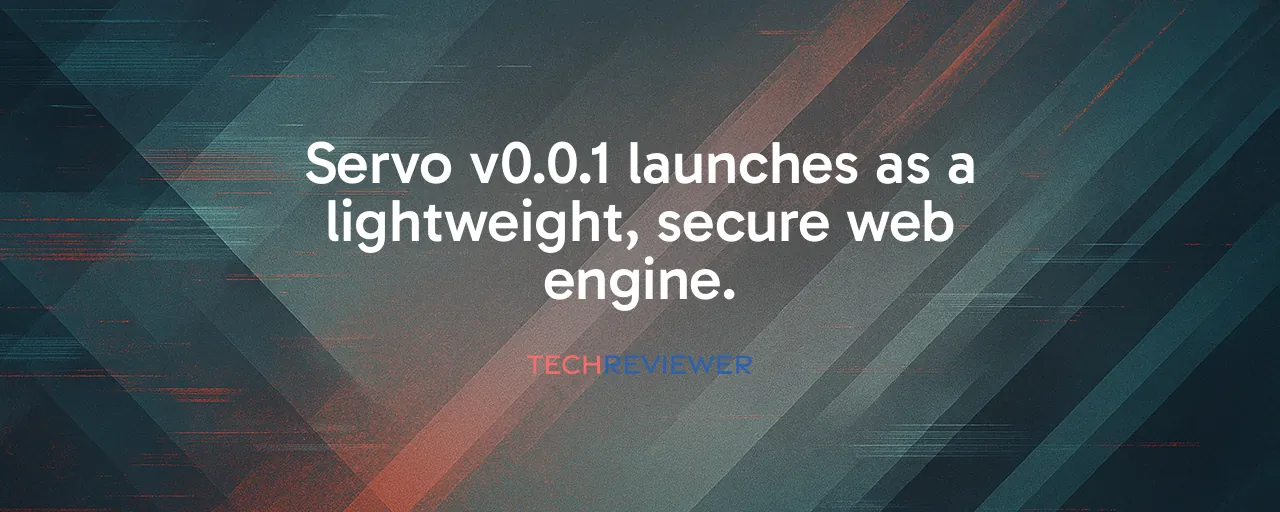A New Chapter for Servo
The web runs on a handful of engines, think Chrome's Blink, Apple's WebKit, or Mozilla's Gecko. But a new contender, Servo, just hit a key milestone with its v0.0.1 release on October 20, 2025. Built from the ground up in Rust, this open-source project aims to shake up how we render web content. Unlike its heavyweight rivals, Servo focuses on being lightweight, secure, and embeddable, making it a fresh option for developers building everything from IoT devices to desktop apps.
This first tagged release, led by Igalia and backed by Linux Foundation Europe, isn't about flashy consumer browsers. Instead, it's a step toward giving developers a modular, high-performance tool for embedding web content. With monthly releases now planned, Servo's team is signaling a commitment to steady progress, even if it's not ready to replace your daily browser just yet.
Why Rust Matters for the Web
Servo's secret weapon is Rust, a programming language designed for safety and speed. Unlike C++ based engines, Rust eliminates entire classes of bugs, like memory leaks or data races, that have long plagued browsers. This means fewer crashes and vulnerabilities, a big win for developers and users alike. Plus, Servo's architecture taps into modern multi-core processors, splitting tasks across cores for faster rendering.
Take WebGPU and WebGL support, for example. These features let Servo handle GPU-accelerated graphics, perfect for games or data-heavy web apps. By breaking the engine into reusable Rust crates, Servo also makes it easier for developers to pick and choose components, whether they're building a smart fridge interface or a cross-platform app.
Real-World Wins: Oniro and Tauri
Servo's potential shines in projects like Oniro, an open-source operating system for IoT devices launched by the Eclipse Foundation in 2021. By integrating Servo as its web engine, Oniro powers web content on resource-constrained devices, like smart home gadgets. Its support for OpenHarmony, added in July 2024, shows how Servo can adapt to niche platforms where heavyweights like Blink might struggle. The lesson? Servo's lightweight design fits where traditional engines feel bloated.
Then there's Tauri, a framework for building lightweight desktop apps. In March 2025, Tauri announced experimental Servo integration, letting developers swap out WebView2 or WebKit for a leaner alternative. This move highlights Servo's edge in simplifying app development, though it also reveals a challenge: incomplete features mean adopters must be ready to pitch in or tolerate gaps.
The Road Ahead: Promises and Hurdles
Servo's v0.0.1 release brings new tools, like a WebView API that cuts the code needed to embed web content from 200 lines to under 50. It also supports platforms like Apple Silicon Macs without requiring users to compile it themselves. But hurdles remain. Many websites still render incorrectly, and accessibility features, like screen reader support, are incomplete, limiting Servo's reach in regulated markets.
Funding is another concern. With over 500 donors in 2024 and backing from the Sovereign Tech Fund, Servo has momentum, but it lacks the deep pockets of Google or Apple. Still, its open governance under Linux Foundation Europe offers stability, and its focus on niche applications could carve out a sustainable path. European regulators, eyeing laws like the Digital Markets Act, see Servo as a way to boost competition in a market dominated by a few giants.
What Servo Means for the Future
Servo isn't trying to dethrone Chrome or Safari overnight. Its strength lies in offering an alternative, something the web desperately needs. With 79 percent of browsers running on Blink, a single bug or decision from Google can ripple across the internet. Servo, with its independent roots and memory-safe design, could balance that power, giving developers and users more choice.
The bigger picture is about the open web. Servo's progress, from its Mozilla days to its revival under Igalia, shows what's possible when communities rally around a shared goal. Whether it's powering a car dashboard or a new app framework, Servo's v0.0.1 release is a reminder that innovation often starts small, with a few lines of code and a bold idea.
